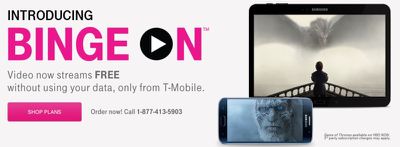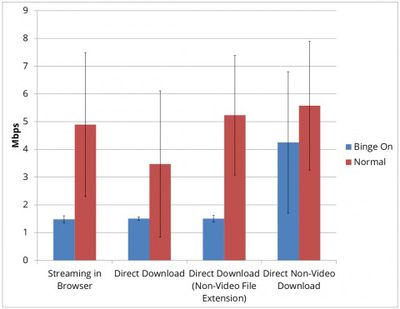A new test by the Electronic Frontier Foundation has found that T-Mobile's free video streaming program Binge On does in fact affect the streaming of all in-browser video content when the service is enabled. Although T-Mobile has stated Binge On works with just its 24 allied partners, some companies like YouTube have spoken out regarding the fact that the new program throttles all video and not just the content of its partners.

EFF recently composed a test to find out the truth behind the throttling claims, running similar smartphones on T-Mobile LTE connections in the same location and at the same time of day. Measuring the throughput between the video on the server and the smartphone running the content, the site in total performed four tests with Binge On enabled:
-Streaming a video embedded in a webpage using HTML5 (“Streaming in Browser”),
-Downloading a video file to the phone’s SD card (“Direct Download”),
-Downloading a video file to the phone’s SD card, but with the filename and the HTTP response headers changed to indicate it was not a video file (“Direct Download, Non-Video File Extension”), and
-Downloading a large non-video file for comparison (“Direct Non-Video Download”).
The site's big takeaway came from its HTML5 in-browser streaming test. It discovered that when Binge On is enabled on a T-Mobile smartphone, all HTML5 video streams are throttled to about 1.5Mbps, "even when the phone is capable of downloading at higher speeds, and regardless of whether or not the video provider enrolled in Binge On." The throttling speeds affected downloads as well, even when customers were downloading a browser video to watch later.
Video files with HTTP headers and filenames that indicate the content is not a video were also throttled during the tests, but T-Mobile assured the site that it has means to detect video-specific patterns that don't directly delve into a user's communications or "involve the examination of actual content."
Lastly, EFF found that Binge On's optimization claims may be mostly false regarding the enhancement of video quality on a smartphone using the program. The site found that the service "doesn't actually alter or enhance" video content when it is streamed from the network and onto a smartphone, and really only throttles it down to 1.5Mbps so that users can take advantage of the free streaming service.

Our last finding is that T-Mobile’s video “optimization” doesn’t actually alter or enhance the video stream for delivery to a mobile device over a mobile network in any way. 2 This means T-Mobile’s “optimization” consists entirely of throttling the video stream’s throughput down to 1.5Mbps.
If the video is more than 480p and the server sending the video doesn’t have a way to reduce or adapt the bitrate of the video as it’s being streamed, the result is stuttering and uneven streaming—exactly the opposite of the experience T-Mobile claims their “optimization” will have. In other words, our results show that T-Mobile is throttling video streams, plain and simple.
The drama surrounding Binge On began around the time that the FCC began scrutinizing free data programs like the T-Mobile service, with others including AT&T's Sponsored Data program and Comcast's Stream TV. Although not yet an official investigation, the FCC remains concerned over each service's abidance to the net neutrality rules, and as such has requested "relevant technical and business" representatives from each of the three companies to discuss the topic before January 15.























Top Rated Comments
Why not just let Binge On, if successful, encourage people away from unlimited on its own?
T-Mobile, while I might move to them at some point, seems to be slowly heading the way of other carriers now that they are succeeding in getting new users, they are making moves more similar to other carriers as they realize the impact on their network from high GB and unlimited users.
Yes, the service should have been set to opt in and I can see this as a problem for less technical people but this is easily fixed. As long as people opt in and inform them of the effects of Binge On, then I don't see this as a big deal at all. I still think this is a pretty amazing service and I'm not even a T-mobile customer.